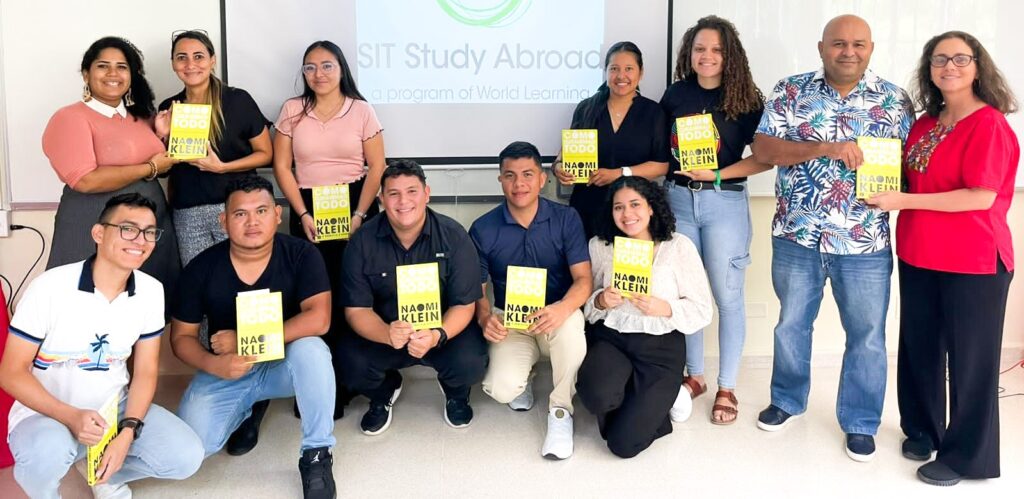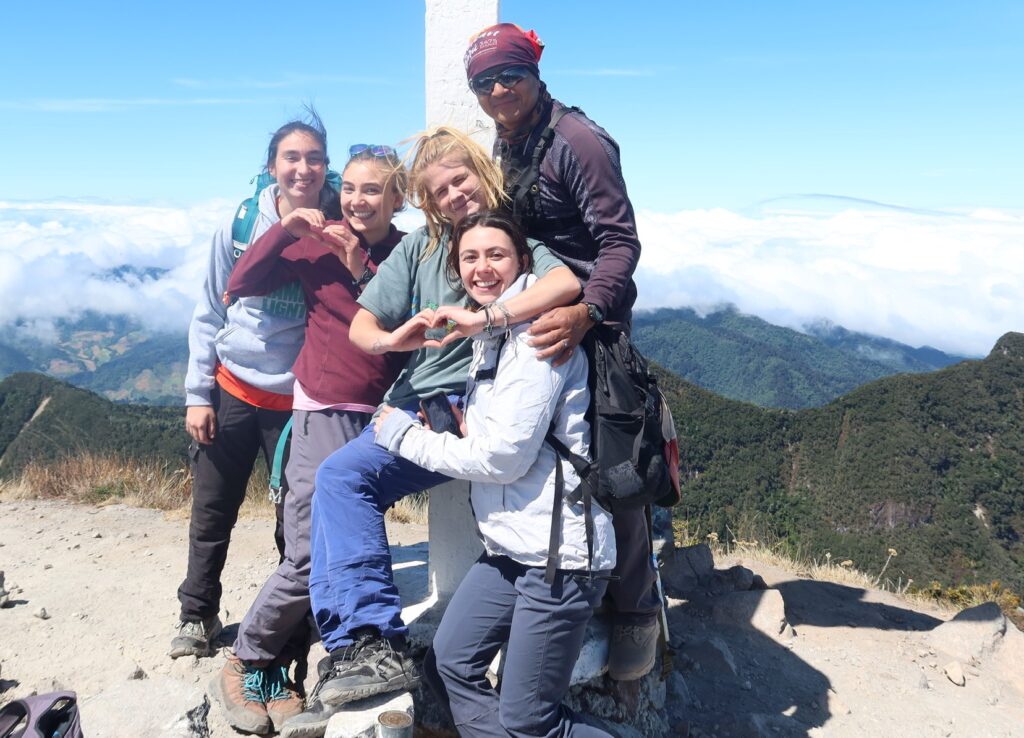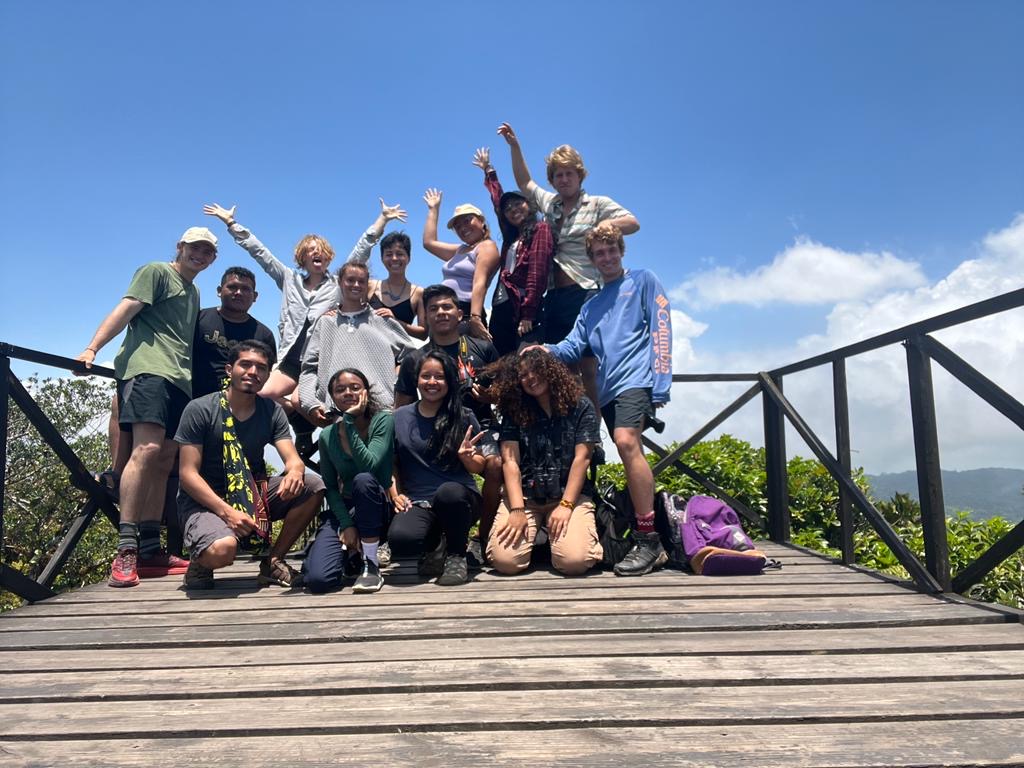U.S., Panamanian students study together, thanks to U.S. Embassy grant
November 28th, 2023 | SIT Study Abroad
By Mariama Dumbuya

Last year, SIT won a grant to fund 12 university biology students from Panama to participate in the Panama: Tropical Ecology, Marine Ecosystems, and Biodiversity Conservation program with 24 SIT program participants. The grant was sponsored by the U.S. embassy in Panama as part of the Public Diplomacy Small Grants Program. The purpose of the grant was twofold: for the Panamanian students to increase their knowledge of and gain hands-on field experience with the ecosystems around Panama and to engage in cultural exchange with the SIT students.
The 12 students returned for SIT’s spring 2023 session to take part in the Independent Study Project period with the current group of U.S. students, where they did further fieldwork and spent time building connections with their U.S. counterparts. The Panamanian students have continued to receive support through sponsorships to attend conservation conferences, mentoring, and classes.
Our students, although of different backgrounds, cultures, and languages, came together through their mutual interests and shared dreams of a greener and bluer planet.
Panama Academic Director Aly Dagang
“To build a more peaceful world, face-to-face interaction and understanding is vital,” says Aly Dagang, academic director for the program. “Our students, although of different backgrounds, cultures, and languages, came together through their mutual interests and shared dreams of a greener and bluer planet. By forming relationships, we create a greater understanding of the planet's challenges and why these issues persist. Through understanding, we create collaboration, and through collaboration, we problem solve.”
We spoke with two program participants, Clara Maxwell and Julissa Guevara, about their experience with the program, their interest in ecology, and why they think cultural exchange is important. Clara was an SIT program participant who recently graduated from Rhodes College with a degree in environmental science. Julissa is a student at Universidad Tecnológica de Panamá studying forestry engineering. The following conversation has been edited for length and clarity.

Why were you interested in studying ecology and biodiversity?
Clara: I was really interested in studying tropical ecology and the ecology in Panama because I come from the mountains. I was studying environmental science in Memphis, and there weren't many opportunities to study the biodiversity and ecology in the area in-depth. I really wanted to try something new and immerse myself in a new area.
Julissa: I really like studying forestry, forest compensation, ecology, and animals. I never had the opportunity to study animals in my degree, so this was a good opportunity to study them.
What do you think are the main issues related to your field of study?
Clara: One of the biggest issues in the forestry field is the trees being cut down in Panama. I've been working on research in the Amazon looking at deforestation over time. That's a really big issue that's tied back to humans' relationship with the earth and how we use resources. And dealing with the consequences of global warming, like the natural disasters and everything that's happening. We're coming to a point in time where there's a lot more urgency to figure it out, and I think people are trying to figure it out.
Julissa: When I was younger, I had this question of how human beings can have a relationship with the forest, and that's part of my degree. Understanding how humans and the environment can live hand-in-hand. How do you approach that? And how do you study the environment to understand that?
Also, deforestation in Panama is really big because of farming and agriculture. It's the principal reason for the degradation and deforestation in Panama.
What did you do for your independent study project?
Clara: I went to Bocas del Toro, and I lived on a little island in the Caribbean with some of my friends. I studied mangrove biomass, so I was measuring the biomass at different distances from a really popular tourist beach on the island.
Julissa: I went to Los Santos and I did a study on forestry compensation.

What was one major thing you learned from the program?
Clara: I learned a lot of methods to do fieldwork. We did so much fieldwork and because it was so expansive across so many disciplines, we were doing different types of fieldwork every other week.
Julissa: I enjoyed meeting different professors with different methodologies about different topics. It's really good for me because of my career path. I’ve had the same science professor for five years, so the change is good.
What did your two groups learn from each other?
Clara: Julissa and I were actually roommates on many occasions. We got to spend a lot of time together. Being with the Panamanians was so amazing because you're in their country, you're learning about their environment. If they weren't there, there would've been a key component missing because then you're not learning from somebody who's from the country. We got to learn many things we wouldn't have been able to if they weren't there. Like little tidbits about the cities that we were in.
Julissa: I agree with Clara. It’s pretty much the same.
Why do you think cultural exchange is important?
Clara: I keep going back to compassion, but that was a huge part of the program, having compassion for people and the environment. What are you giving back to these places that you visit? I think the cultural exchange really enhanced that sentiment. When we were traveling to the different locations, the Panamanian people talked to us to build this relationship with Panama that was deeper than just visiting a banana farm or visiting a cacao farm.
Julissa: In Panama, there's a lot of cultural exchange because of the Panama Canal; that's a really great part of the country. Everybody has different ideas and thoughts, and coming together and expressing that creates a better environment.

What are your plans for the future?
Clara: Last summer, I worked for NASA, which was really fun. I was doing remote sensing, so less fieldwork but looking at satellites and seeing how the earth is changing over time. I really could not have done that without this program. It showed me so many ways to study the environment. I carried that with me through the rest of college to finish my degree, and I plan on continuing school eventually. The program really created a strong foundation for that.
Julissa: I want to fight for the protection and conservation of the natural resources of the country, and I want to specialize in the management of protected areas. In the communities where agroforestry and forestry systems are carried out I want the forest to no longer be seen as an enemy but as an ally.
